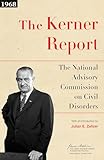The Kerner Report / National Advisory Commission on Civil Disorders.
Material type: TextSeries: The James Madison Library in American PoliticsPublisher: Princeton, NJ : Princeton University Press, [2016]Copyright date: ©2016Description: 1 online resource (544 p.)Content type:
TextSeries: The James Madison Library in American PoliticsPublisher: Princeton, NJ : Princeton University Press, [2016]Copyright date: ©2016Description: 1 online resource (544 p.)Content type: - 9780691169378
- 9781400880805
- African Americans -- Economic conditions -- 20th century
- African Americans -- Social conditions -- 20th century
- African Americans
- Police brutality -- United States -- 20th century
- Riots -- United States -- 20th century -- Case studies
- Riots -- United States
- Urban poor -- United States
- POLITICAL SCIENCE / Civil Rights
- 1967 riots
- African American
- Chicago
- Detroit
- Division Street
- Los Angeles
- National Guard
- Newark
- Watts
- black
- causes
- ghetto
- inequality
- inner city
- looting
- origins of urban crisis
- police brutality
- police violence
- poverty
- race riots
- roots of American racial divide
- segregation
- separate and unequal
- systemic racism
- underclass
- uprising
- urban poverty
- violence
- what caused the 1960 riots
- what did Kerner Commission recommend
- what was Kerner Commission
- white flight
- white racism
- white supremacy
- 364.14/3 23
- HV6477
- online - DeGruyter
- Issued also in print.
| Item type | Current library | Call number | URL | Status | Notes | Barcode | |
|---|---|---|---|---|---|---|---|
 eBook
eBook
|
Biblioteca "Angelicum" Pont. Univ. S.Tommaso d'Aquino Nuvola online | online - DeGruyter (Browse shelf(Opens below)) | Online access | Not for loan (Accesso limitato) | Accesso per gli utenti autorizzati / Access for authorized users | (dgr)9781400880805 |
Frontmatter -- Contents -- General Editor's Introduction -- Introduction to the 2016 Edition -- Foreword -- The National Advisory Commission on Civil Disorders -- Summary -- Preface -- Part I .What Happened? -- Chapter 1. Profiles of Disorder -- Chapter 2. Patterns of Disorder -- Chapter 3. Organized Activity -- Part II. Why Did It Happen? -- Chapter 4. The Basic Causes -- Chapter 5. Rejection and Protest: An Historical Sketch -- Chapter 6. The Formation of the Racial Ghettos -- Chapter 7. Unemployment, Family Structure, and Social Disorganization -- Chapter 8. Conditions of Life in the Racial Ghetto -- Chapter 9. Comparing the Immigrant and Negro Experiences -- Part III. What Can Be Done? -- Chapter 10. The Community Response -- Chapter 11. Police and the Community -- Chapter 12. Control of Disorder -- Chapter 13. The Administration of Justice under Emergency Conditions -- Chapter 14. Damages: Repair and Compensation -- Chapter 15. The News Media and the Disorders -- Chapter 16. The Future of the Cities -- Chapter 17. Recommendations for National Action -- Conclusion -- Appendixes -- Remarks of the President upon Issuing an Executive Order Establishing a National Advisory Commission on Civil Disorders, July 29, 1967 -- Biographical Materials on Commissioners -- Index
restricted access online access with authorization star
http://purl.org/coar/access_right/c_16ec
The Kerner Report is a powerful window into the roots of racism and inequality in the United States. Hailed by Martin Luther King Jr. as a "physician's warning of approaching death, with a prescription for life," this historic study was produced by a presidential commission established by Lyndon Johnson, chaired by former Illinois governor Otto Kerner, and provides a riveting account of the riots that shook 1960s America. The commission pointed to the polarization of American society, white racism, economic inopportunity, and other factors, arguing that only "a compassionate, massive, and sustained" effort could reverse the troubling reality of a racially divided, separate, and unequal society. Conservatives criticized the report as a justification of lawless violence while leftist radicals complained that Kerner didn't go far enough. But for most Americans, this report was an eye-opening account of what was wrong in race relations.Drawing together decades of scholarship showing the widespread and ingrained nature of racism, The Kerner Report provided an important set of arguments about what the nation needs to do to achieve racial justice, one that is familiar in today's climate. Presented here with an introduction by historian Julian Zelizer, The Kerner Report deserves renewed attention in America's continuing struggle to achieve true parity in race relations, income, employment, education, and other critical areas.
Issued also in print.
Mode of access: Internet via World Wide Web.
In English.
Description based on online resource; title from PDF title page (publisher's Web site, viewed 30. Aug 2021)


